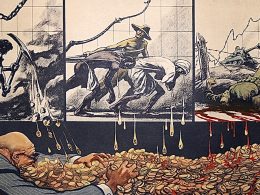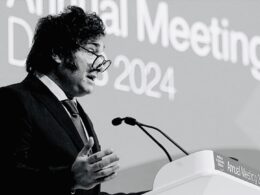Even if a communist can colloquially describe themselves as being on the left, there’s a distinction between communism and “the left.” This is implied right in the title of Lenin’s Left-Wing Communism: an Infantile Disorder. Whereas the left, a big tent term for a myriad of incompatible ideologies, aims merely to act as an opposition towards the present order for the sake of it, communists have a coherent vision for how to defeat the system: by advancing history’s development to the next stage. The left, because of its lack of commitment to that central Marxist goal, naturally takes on an opportunistic role. Because when you want only to build a movement as an end in itself, rather than use this movement as a means for defeating the system, you become nothing more than an actor who benefits from discontent without helping solve the problems behind that discontent.
This is the framework through which we can understand the inevitable rift that’s developing between the political actors who are serious about revolution, and the ones who only seek to perpetuate “the left” even if the left doesn’t actually win victory for the workers. That the left has failed the class struggle, and remains an inert force from the perspective of historical agency, doesn’t matter to the opportunists as long as they can keep benefiting from the left’s existence. From the discourse, organizing, and academic spaces that provide those in them with either social or monetary benefits. To maintain access to these spaces, there are certain ideas that you can’t challenge. Even if those ideas are instrumental in preventing the construction of an effective workers movement, and the overthrow of the capitalist state.
Selling eco-fascism through a “left” angle
During the stage of capitalist decline that we’ve been in since the 2008 collapse, where the consequences of American deindustrialization for working class living standards are being felt worse than ever, one of these untouchable ideas is “degrowth.” The defenders of degrowth who posture as Marxists insist that the idea’s Malthusian liberal iteration can be separated from what they imply to be a “Marxist” version of it, but the practical reality of our conditions in the imperial center shows that such a separation can’t come about. If we implemented a Marxist version of degrowth, it would no longer be degrowth, it would be something too far removed from that to still honestly be deserving of the label.
This is because the imperial center’s deindustrialization has made it so that in order to raise the continent’s workers up from their appalling present conditions, we’ll need to revitalize American industry. Not in the capitalist way of industry for the sake of profit, but in the socialist way of industry for the sake of humanitarianism. If the people within what’s now called the “United States” are to build a strong economy after they’ve cut themselves off from imperialism’s extractive benefits, they’re going to need to rebuild their decayed factories. The destruction of these factories has amounted to a decades-long series of what are effectively industrial terrorist attacks against the working class, carried out by the capitalist class. The bourgeoisie have committed these crimes so that they can intensify the subjugation of countries like Mexico, whose people were placed under such a cruel level of exploitation after NAFTA that this provoked the country’s southern tip into a revolution. To undo these wrongs, while bringing ourselves out of the poverty which neoliberalism has forced upon us, we’ll need to re-industrialize in at least some aspects.
This goal is compatible with the replacement of cars with high-speed rail transportation like in east Asia, the elimination of fossil fuels as an electricity source, and the other measures required for combating global warming. But the left’s dominant discourse voices don’t believe these things can be reconciled, instead deciding to put forth misleading arguments that make the solution I’ve described appear untenable (for example: portraying nuclear energy as still too unsafe to replace fossil fuels, even though existing socialist countries have successfully implemented nuclear). The only solution these leftists can help advance is, ironically, an eco-fascist one, where the wellbeing of the poor gets sacrificed to keep the climate crisis from destroying capitalism.
Even if these leftists imagine degrowth can mean something different, that’s the goal they’re advancing in effect. Because as long as they aren’t putting forth a serious alternative to capitalism, capitalism will persist and devolve into eco-fascism. Remember that the purpose of these actors is not to defeat the system, but to profit off of the discourse which arises in response to the system’s contradictions.
It’s this fundamental lack of seriousness, this prioritization of what keeps you in the left circle rather than of what’s needed to bring change, that’s behind another psyop the anti-Marxist left is promoting: the “drug workers” psyop. If the purpose of the degrowth psyop is to defend the “green” corporations, the purpose of the drug workers psyop is to defend the CIA. That’s what anyone who uses that phrase, or who minimizes the CIA’s role as the core source behind this hemisphere’s self-destructive drug use, is in effect doing.
Working to lumpenize the workers
Drugs, even the milder drugs like psychedelics and marijuana, have been historically weaponized by the state against the revolutionary cause. From the CIA’s ongoing operation to flood poor nonwhite communities with crack, to the project to replace reading theory with taking psychedelics as young people’s means for gaining an alternative consciousness, to the common COINTELPRO tactic of having infiltrators manipulate organizers by introducing them to narcotics, these substances have been used as tools to lumpenize the workers. To keep them from gaining organization by throwing their households into addiction-induced dysfunction, and by using milder substances to sway developing radicals away from becoming effective revolutionaries.
Therefore, the correct attitude for a Marxist to have towards drugs is one of resisting the liberal attempts at fetishizing them. To reject the recent effort by liberals on social media to classify drug pushers as “drug workers,” a phrase which in addition to obscuring the anti-revolutionary use of these substances also works to render the concept of the proletariat meaningless. Because if the agents of the CIA’s narcotics wing are proletarians now, then the word “worker” has lost its material significance. The thought process behind this abuse of language and theory comes from a fundamental misinterpretation of what socialism is. Socialism is not moralism. At its core, it’s not an effort to lift up the generally dispossessed. It’s an effort to put the workers, in particular, into power. That the street pushers are doing this out of economic dispossession doesn’t change their class character. They still lack the unique relationship to the means of production that the proletariat has, the role that makes the proletariat in a position to shut down the economy if they were to stop working.
That these liberals have an altruistic intent behind using the “drug worker” slogan, or behind their portraying drugs as something not worth combating in any capacity, is irrelevant. What matters are the consequences their actions have, which are to assist the CIA’s poisoning of the workers.
I don’t believe China’s anti-drug policy model, which came from a reaction to the opium crisis, is entirely applicable to America’s conditions or even entirely reasonable in its own conditions. China’s criminalizing marijuana isn’t necessary, though the substance can cause dementia symptoms in teens and it therefore may be worth restricting the sale of it to them. What China has taught us is that under a socialist system, where the government’s policies are by default designed to lift up even the dispossessed former lumpen, repression can still be effective at reducing addiction. In its descriptions of the progress the PRC has made in this, the country’s embassy explains how that progress hasn’t merely come from executing the suppliers, as arguably justifiable as this practice may be. Other crucial parts have been the initiatives the government has undertaken to improve the people’s conditions:
Rectification was carried forward and [the] situation in critical drug-affected areas had been fundamentally changed. Placing importance on key areas and prominent drug-related issues, the Chinese authorities urged local governments to earnestly fulfil their responsibilities, take targeted and integrated measures to effectively address the prominent issues faced by 139 counties, cities and districts, e.g. drug manufacturing, cultivation, trafficking, abuse, etc., contributing to the continuous improvement of the whole drug situation in China. The creation and demonstration of model cities was solidly advanced which brought visible improvement to the city-wide management of drug issues. The Chinese authorities innovatively conducted demonstration of model cities under the Safe China initiative and won great support from the governments of participating cities. The Chinese authorities also strengthened the organizational leadership, clarified responsibilities, optimized policies and measures, and deepened the comprehensive governance. China National Narcotics Control Commission designated the first batch of 41 national anti-drug demonstration cities, promoted their best practices and successful experience, and improved the drug control work at city level throughout China.
This progress has involved giving the lumpenproles who formerly had little choice other than to enter into the drug trade with opportunities to get better jobs. Meaning that when China has executed drug dealers, these dealers have not been victims of a cruel system, but rather opportunists who’ve been willing to harm the revolution’s interests out of personal greed. Even though the Chinese revolution’s saving 800 million from poverty has in effect involved generally lifting up the dispossessed, if the revolutionaries had let the criminal element share in state power prior to its having become proletarianized, the revolution would have dissipated long ago. This is because individuals with no material incentive to build up the productive forces, due to their being detached from these forces, will be susceptible to acting as agents for counterrevolution. The way to minimize the amount of people who have a material incentive to enter into the drug trade is by resisting liberalism’s deceptive, undialectical argument about how we have a supposed moral duty to treat the lumpen as if they were proletarians. Because if you do that, the revolution will fail, and these people the liberals claim to care so much about will never be able to escape their poverty.
Other important measures within an optimal socialist anti-drug program are setting up rehabilitation services for those addicted, and educating the party’s members about the risks that can come even from using marijuana or psychedelics. It would be excessive to purge anyone who uses them, that would be puritanical. Yet it would be completely irresponsible to let the liberal drug fetishization psyop influence our organizing culture without any kind of pushback. What the liberals seek to do is convince those in the process of developing revolutionary consciousness that there’s no need to caution oneself against getting a drug habit, or to seek rehabilitation if they’re addicted to these milder kinds of drugs. That these substances aren’t deadly doesn’t mean they can’t hinder somebody’s ability to act in a disciplined way, and to contribute to the struggle.
If someone has come into this situation, they should absolutely seek help to get out of it. Not take the advice of the liberals to pretend like there’s no possible problem with taking these drugs, or who advocate for total unrestrained legalization of even the worst kinds. Once we’ve built a system for supporting those who are addicted, and raised living standards so much that today’s drug dealers have the option to get out of that lifestyle, we’ll be able to go after the black market dealers without this having the oppressive effects of America’s War on Drugs. We could bypass the flawed rigidity of China’s own anti-drug campaign by even going so far as to open up legal means for distribution, which would make it more than justified to target those who still distribute illegally. As they would only be doing this for exploitative and destructive ends.
These are the dialectically informed solutions, which the liberals don’t want us to embrace. The idea the anti-Marxist wreckers consistently promote is that we don’t need to prioritize what’s demonstrably best for the revolutionary cause, that we can make up our own rules. That’s how the ultra-leftists among these types promote gang fetishization, which is naturally intertwined with drug fetishization. As the imperial center sees a growing resistance towards NATO and American militarism, this ahistorical way of analyzing our conditions is being used primarily to frustrate this resistance effort.
Replacing anti-imperialism with a radlib version of “anti-colonialism”
Laine Sheldon-Houle, a member of the Swan River first nation, has identified the way that “anti-colonialism” as we typically understand it is incompatible with Marxism:
In 2012, Eve Tuck and K. Wayne Yang published an essay titled “Decolonization is not a metaphor”, in which they argue that decolonization means: “For social justice movements, like Occupy, to truly aspire to decolonization non-metaphorically, they would impoverish, not enrich, the 99%+ settler population of the United States.” This directy pits Indigenous people against “settlers”. The 99 per cent figure the Occupy movement was referring to is the entire population minus the wealthiest top one per cent. This is mostly referring to the working class, although not in a precise way. The cynical conclusion in “Decolonization is not a metaphor” is that the fundamental interests of Indigenous people are opposed to the interests of all non-ndigenous people. But in reality this is not the fundamental division in capitalism. In fact, within the Indigenous community there are Indigenous capitalists who benefit from the exploitation of Indigenous and non-Indigenous workers. In response to the explosion of the Indigenous movement, the Canadian Liberal government has been hard at work fostering an Indigenous ruling class to co-opt Indigenous leaders and give off an appearance of change.
That Decolonization is not a metaphor unambiguously calls for the further impoverishment of the working class has not stopped it from becoming a standard resource to be promoted within the left, much like J. Sakai’s Settlers or the works of Gerald Horne. This is because like Sakai and Horne, promoting it is maximally beneficial for somebody who seeks to gain favor within these opportunistic spaces. These resources can make those who cite them appear virtuous and in touch with marginalized peoples, while not actually posing a threat towards ruling class power.
This is apparent in how the 1619 Project, despite supposedly having the purpose of mounting a serious opposition towards this country’s structures of oppression, has been facilitated by the New York Times. The Times, the Democratic Party, “post-colonial” academia, and the online actors who uncritically propagate their version of “anti-colonialism” can denounce white supremacy all they like, while still not doing a thing to bring the state closer to its demise. And they like it that way, because their goal is not to advance the revolutionary cause but to gain the benefits which come from being a “left” critic. Systemic criticism isn’t helpful if you’re doing it in a way that actively harms the practical efforts towards revolutionary change. Which they’re doing not just by pitting indigenous and black people against the white workers, but by trying to discredit the dialectical view of history. The view which can guide a developing radical towards participating in the most important goal Marxists are tasked with during the present moment: combating U.S. imperialism.
What this opportunistic element seeks to do is replace anti-imperialism with anti-colonialism. Which, when used for such a purpose, is not an idea which actually has hope for undoing the effects of European colonialism. We can see this in how the New York Times, however willing it is to platform those who critique the USA’s power structure from this liberal “anti-colonial” perspective, continuously promotes imperialist propaganda. Why would the Times and its ideologically aligned liberal institutions embrace Horne’s arguments about the illegitimacy of the American state if they’re so obviously invested in reinforcing this state, and in perpetuating its global violence? Because the type of critique offered by Horne, and by the other “anti-colonialists” who lack a dialectical analysis, is so broad-reaching that it ironically undermines its own ability to pose a serious threat towards the state’s existence.
A central part of Horne’s ideas, and one which the Times has naturally ignored objections to, is the argument that 1776 was not a progressive historical event. In addition to this assertion’s relying on historical falsifications within Horne’s work, and contradicting the view of 1776 that’s been held by every major historical communist figure, it’s simply not a necessary one to make in the task of arguing that the United States needs to be abolished. All you have to do to make this argument is point out how the U.S. empire continues to subjugate and exploit its internal colonies. And how even if this state’s formation could be considered progressive within its context, there’s no reason this state needs to keep existing long after capitalism became ripe enough to make us ready for proletarian revolution.
But Horne and these other left critics still make this seemingly pointless argument, as well as the even more needless argument that the proletariat’s white section has material interests which are fundamentally opposed to those of the internal colonies. (As demonstrated in Horne’s statement about how “Euro-Americans vote across class lines for faux billionaires,” which leaves out the important context that MAGA has been disproportionately petty-bourgeois.) This is because their priority is not to advance the workers movement, but to “critique” society simply for the sake of doing so. What consequences these critiques may have for the workers movement are disregarded, for the same reason many among these critics devalue the concept of a workers movement by claiming it goes against the interests of the internal colonies.
This type of critique relies upon a view of history that’s incompatible with the Marxist view. The Marxist view considers a development as progressive when it acts to bring history’s development closer towards communism, when it progresses history to the next developmental stage. Within this mode of analysis, Russia’s war against Ukrainian fascism is progressive, not just because it’s destroying a fascist military but because it’s working to resolve the primary global contradiction: U.S. hegemony. The view of history promoted by the left opportunists is one which says if something has contradictions, it’s necessarily reactionary, which explains why they can rationalize calling 1776 reactionary despite whatever counter-evidence they’re confronted with.
What kind of impact does this analytical framework have on one’s practice? It leads one to neglect the primary revolutionary task of the present moment, which is combating U.S. imperialism and its psyops, in favor of an insular type of “anti-colonial” rhetorical discourse. A discourse that today has an even more skewed view of the world than the “anything but class” left discourses which Parenti described, because this new discourse is intensely online. The minds of those within this fandom-type space are not focused on building an antiwar coalition, or reaching the workers during this moment’s great opportunity for mass radicalization, or fighting imperialism’s psyops. They’re focused on whatever online enemies the fandom is at war with, limiting their ability to connect with anybody who hasn’t gone down the particular pipeline that leads someone to get assimilated into these kinds of circles.
Like with the degrowth discourse and the drug workers discourse, the actors driving this kind of “anti-colonial” discourse are fundamentally unserious. We do not need to appease them to succeed in our revolutionary task, in fact they’re a hindrance to our goals. And like with those other examples, existing socialism provides a solution to the problems they speak to, a solution that’s actually practicable. Socialist countries, historically and to this day, have anti-colonial programs. What I’ve had to learn is that there’s a difference between “decolonial” or “post-colonial” theory, which are liberal academic means for “critiquing” society, and Marxist anti-colonial theory, which is to say Marxism itself. The solution is to abolish the United States so that the internal colonies can be given self-determination with a socialist character, something that can’t happen unless we’re serious about reaching the people. Do not abandon the dialectical path to please the manipulatively moralistic cries of actors who don’t even have the revolution’s best interests in mind. Stick by what dialectics tells you is true, and you’ll win.
————————————————————————
If you appreciate my work, I hope you become a one-time or regular donor to my Patreon account. Like most of us, I’m feeling the economic pinch during late-stage capitalism, and I need money to keep fighting for a new system that works for all of us. Go to my Patreon here.








